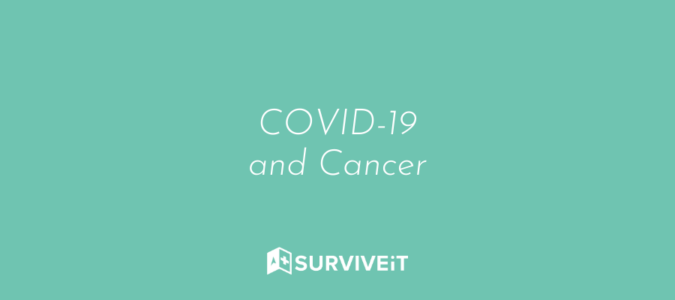COVID-19 (Coronavirus) and Cancer

Last updated February 3, 2021
Our community is especially impacted by the COVID-19 virus. Many of us are at a higher risk, hospital systems are assessing necessity of appointments to limit exposure, there are recommendations coming from national authority that impact our daily lives and more. In the midst of this chaotic and fear-provoking time, we wanted to reach out to our community and provide seven quick, actionable tips for those facing cancer.
1. Stay up-to-date with the latest information regarding cancer patients and the COVID-19 vaccine. At this point, cancer patients may be offered the COVID-19 vaccine as long as components of that vaccine are not contraindicated and dependent on how your state is managing the vaccine rollout.. You can advocate for yourself in these unprecedented times by learning about the medical recommendations for cancer patients and the COVID-19 vaccine. Visit this newsroom page to get answers to common vaccine questions. If you have any questions, please consult your doctor.
2. Check the source of information. Identify a way to track legitimate local and national government updates. We recommend the Centers for Disease Control website for national information. Look for your state officials through local news outlets and social media. Many governors, state reps, etc. are posting to their Twitter and Facebook accounts. Be careful of people spreading unreliable stories and information on social media.
3. Cancer patients are at a higher risk and caregivers should be extra cautious as well. Now is the time to ask for help and keep yourself as safe as possible. Try to keep trips to the store and other crowded places to a minimum. Here are some ideas on how to ask for help:
- Ask a neighbor or friend (who is healthy)
- Post to your trusted network on social media (never publicly list your address)
- Reach out to a local church
- Post to your local neighborhood online forum
- *Ask your doctor for a referral to a social worker (they are a fantastic resource)
People are happy to help by bringing you groceries and running errands for you! Kindly ask them to leave the items at your front door, and don’t forget to sanitize items brought into your home.
4. Update the communication information for your doctor and treatment center. Two tips:
- Program your doctor and/or hospital phone number into your phone and/or write it down so it is easy to locate should you need it.
- If your hospital system has a portal communication system with your medical team, make sure you have the credentials to use that as a *non-urgent* form of communication.
5. To minimize the feelings of anxiety, panic and fear, here are some great ideas – most of which have additional resources under our Find Hope tab on the website:
- Take a few moments each day to take deep breaths
- Practice meditation
- Read a book
- Get some sunshine
- Light exercise if approved by your doctor
- Find time for prayer – whatever your faith or religion may be
These are the common COVID-19 symptoms to look out for. Call your doctor if you experience them:
- fever, cough, and shortness of breath
Last, please be mindful of these symptoms as they are considered serious and you should go to your nearest emergency room.
If you develop emergency warning signs for COVID-19 get medical attention immediately. In adults, emergency warning signs:
- Difficulty breathing or shortness of breath
- Persistent pain or pressure in the chest
- New confusion or inability to arouse
- Bluish lips or face
6. Important information for newly unemployed patients who have lost their health insurance. If you’re looking for resources to offer aid during this time, look into who makes your drug. Bristol Myers Squibb is offering an expansion of its existing patient support programs to help eligible unemployed patients in the U.S. who have lost their health insurance. Through this program, eligible patients can get branded BMS medicine for free.
See a full list here (including OPDIVO® and ELIQUIS®)
7. Get guidance and information as to why COVID-19 puts people with chronic conditions at higher risk and how they can protect themselves and loved ones. If you weren’t able to attend the National Briefing with the CDC webinar, here is a recording.
Please know we are here for you. If we can help you in any way please email us at info@surviveit.org.
Stay strong and LiVE FEARLESS!
Team SURVIVEiT
